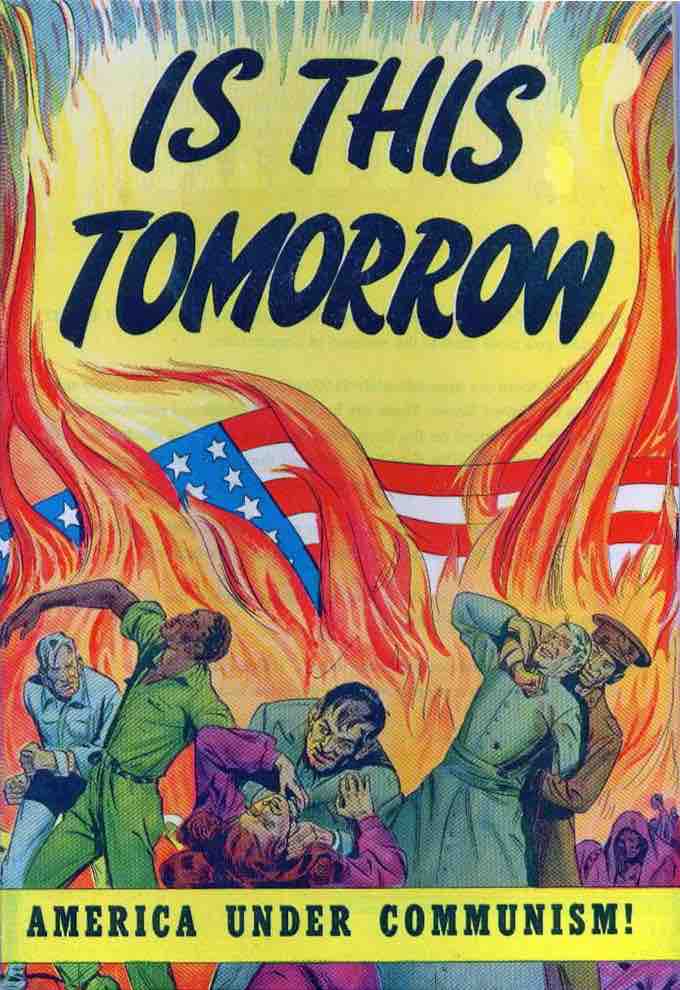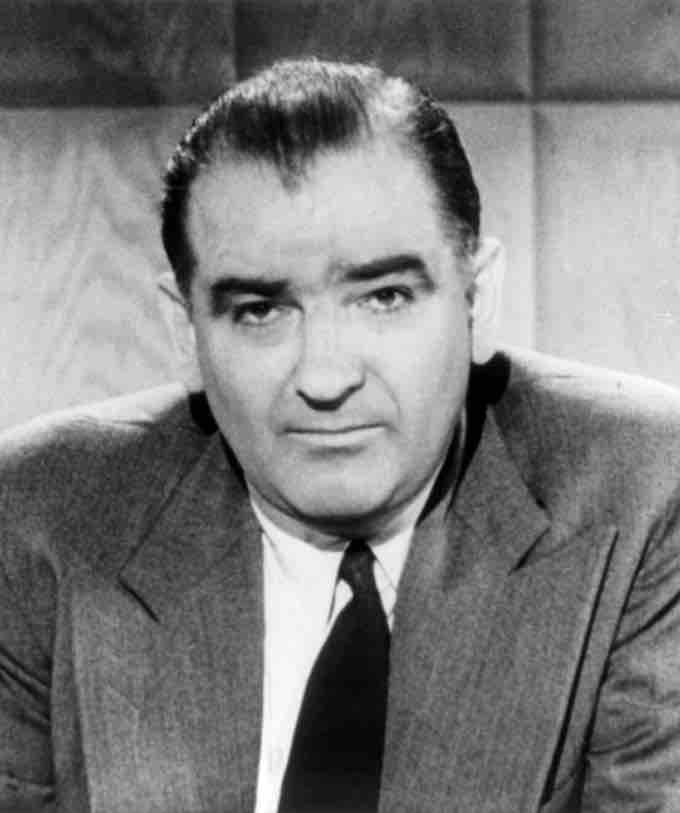Origins
The historical period that came to be known as the McCarthy era began well before Joseph McCarthy's own involvement in it. Many factors contributed to McCarthyism, some of them extending back to the years of the First Red Scare (1917–20), inspired by Communism's emergence as a recognized political force. Thanks in part to its success in organizing labor unions and its early opposition to fascism, the Communist Party of the United States (CPUSA) increased its membership through the 1930s, reaching a peak of about 75,000 members in 1940–41. While the United States was engaged in World War II and allied with the Soviet Union, the issue of anti-communism was largely muted. With the end of World War II, the Cold War began almost immediately, as the Soviet Union installed Communist puppet régimes across Central and Eastern Europe, while the United States backed anti-communist forces in Greece and China.
Events in 1949 and 1950 sharply increased the sense of threat from Communism in the United States. The Soviet Union tested an atomic bomb in 1949, earlier than many analysts had expected. That same year, Mao Zedong's Communist army gained control of mainland China despite heavy American financial support of the opposing Kuomintang. In 1950, the Korean War began, pitting U.S., U.N., and South Korean forces against Communists from North Korea and China. The following year also saw several significant developments regarding Soviet Cold War espionage activities.
There were also more subtle forces encouraging the rise of McCarthyism. It had long been a practice of more conservative politicians to refer to progressive reforms such as child labor laws and women's suffrage as "Communist" or "Red plots." This tendency increased in the 1930s in reaction to the New Deal policies of President Franklin D. Roosevelt. Many conservatives equated the New Deal with socialism or Communism, and saw its policies as evidence that the government had been heavily influenced by Communist policy-makers in the Roosevelt administration. In general, the vaguely defined danger of "Communist influence" was a more common theme in the rhetoric of anti-Communist politicians than was espionage or any other specific activity.
McCarthyism and the Second Red Scare
McCarthyism is the practice of making accusations of disloyalty, subversion, or treason without proper regard for evidence. The term has its origins in the period in the United States known as the Second Red Scare, lasting roughly from 1950 to 1956 and characterized by heightened fears of communist influence on American institutions and espionage by Soviet agents. Originally coined to criticize the anti-communist pursuits of Republican U.S. Senator Joseph McCarthy of Wisconsin, "McCarthyism" soon took on a broader meaning, describing the excesses of similar efforts. The term is also now used more generally to describe reckless, unsubstantiated accusations, as well as demagogic attacks on the character or patriotism of political adversaries.
While Communism was expanding across Europe and Asia, the United States entered an era of paranoia known as the Red Scare. Joseph McCarthy, Republican Senator from Wisconsin gained sudden prominence for his dramatic accusations of Communist espionage and influence inside the U.S. government. Beginning with a dramatic speech delivered in 1950 from Wheeling, West Virginia, McCarthy used his position to make often sensational accusations of Communist infiltration into the State Department, the Democratic administration of President Harry S. Truman, and the United States Army. During that speech, he produced a piece of paper which he claimed contained a list of known Communists working for the State Department. McCarthy is usually quoted as saying: "I have here in my hand a list of 205—a list of names that were made known to the Secretary of State as being members of the Communist Party and who nevertheless are still working and shaping policy in the State Department." This speech resulted in a flood of press attention to McCarthy and established the path that made him one of the most recognized politicians in the United States.
During the McCarthy era, thousands of Americans were accused of being Communists or communist sympathizers and became the subject of aggressive investigations and questioning before government or private-industry panels, committees and agencies. The primary targets of such suspicions were government employees, homosexuals, those in the entertainment industry, educators, and union activists. Suspicions were often given credence despite inconclusive or questionable evidence, and the level of threat posed by a person's real or supposed leftist associations or beliefs was often greatly exaggerated. Many people suffered loss of employment and/or destruction of their careers; some even suffered imprisonment.
Most of these punishments came about through trial verdicts later overturned, laws that would be declared unconstitutional, dismissals for reasons later declared illegal or actionable, or extra-legal procedures that would come into general disrepute.
The most famous examples of McCarthyism include the speeches, investigations, and hearings of Senator McCarthy himself; the Hollywood blacklist, associated with hearings conducted by the House Un-American Activities Committee (HUAC); and the various anti-communist activities of the Federal Bureau of Investigation (FBI) under Director J. Edgar Hoover. McCarthyism was a widespread social and cultural phenomenon that affected all levels of society and was the source of a great deal of debate and conflict in the United States.
Victims of McCarthyism
It is difficult to estimate the number of victims of McCarthy. The number imprisoned is in the hundreds, and some ten or twelve thousand lost their jobs. In many cases simply being subpoenaed by HUAC or one of the other committees was sufficient cause to be fired. Many of those who were imprisoned, lost their jobs or were questioned by committees did in fact have a past or present connection of some kind with the Communist Party. But for the vast majority, both the potential for them to do harm to the nation and the nature of their communist affiliation were tenuous. After the extremely damaging "Cambridge Five" spy scandal (Burgess, Maclean, Philby, Blunt, et al.), suspected homosexuality was also a common cause for being targeted by McCarthyism. The hunt for "sexual perverts," who were presumed to be subversive by nature, resulted in thousands being harassed and denied employment. Many have termed this aspect of McCarthyism the "Lavender Scare."
In the film industry, more than 300 actors, authors and directors were denied work in the U.S. through the unofficial Hollywood blacklist. Blacklists were at work throughout the entertainment industry, in universities and schools at all levels, in the legal profession, and in many other fields. A port security program initiated by the Coast Guard shortly after the start of the Korean War required a review of every maritime worker who loaded or worked aboard any American ship, regardless of cargo or destination. As with other loyalty-security reviews of McCarthyism, the identities of any accusers and even the nature of any accusations were typically kept secret from the accused. Nearly 3,000 seamen and longshoremen lost their jobs due to this program alone.
The End of McCarthyism
McCarthyism began to lose its potency as the perceived threat of Communism receded during the latter half of the 1950s, even as McCarthy and others overreached politically. Arguably, the movement's most dramatic loss of credibility came when Senator McCarthy attempted to accuse the U.S. Army of anti-U.S. leanings. In televised hearings, Army lawyer Joseph Welch accused the Senator of being shameless and dishonorable, as spectators applauded.
In 1957, the Supreme Court ruled on the case of Watkins v. United States, curtailing the power of HUAC to punish uncooperative witnesses by finding them in contempt of Congress. Justice Warren wrote in the decision: "The mere summoning of a witness and compelling him to testify, against his will, about his beliefs, expressions or associations is a measure of governmental interference. And when those forced revelations concern matters that are unorthodox, unpopular, or even hateful to the general public, the reaction in the life of the witness may be disastrous."

This is Tomorrow
A 1947 propaganda comic book raising the specter of a Communist takeover. McCarthy played on Communist fears in the U.S. during the Second Red Scare.

Sen. Joseph McCarthy
A photo of Sen. Joseph McCarthy.